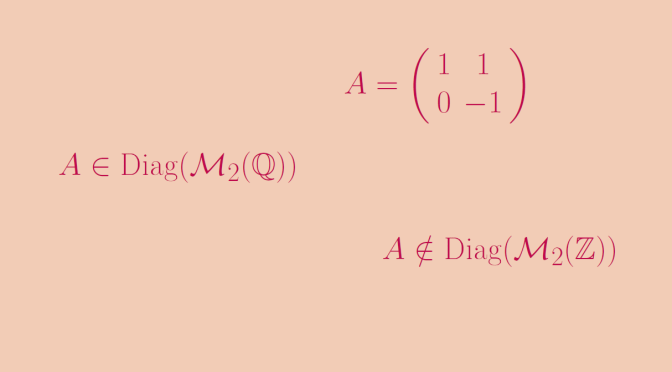Let us recall that a square matrix \(A\) is called diagonalizable if it is similar to a diagonal matrix, i.e. if there exists an invertible matrix \(P\) such that \(P^{-1}AP\) is a diagonal matrix.
It is well known that a square matrix of dimension \(n \ge 1\) over a field \(\mathbb{K}\) that has \(n\) distinct eigenvalues is diagonalizable. The proof is based on the fact that eigenvectors associated to different eigenvalues are linearly independent. Therefore a family of \(n\) eigenvectors associated to the \(n\) distinct eigenvalues is a basis. And over a field the matrix of the change basis from the standard basis to the basis of eigenvectors is invertible.
This doesn’t remain true if we consider a matrix over the ring of the integers \(\mathbb{Z}\), even if the matrix is diagonalizable over the field \(\mathbb{Q}\). For a counterexample we consider the matrix:
\[A=\left(\begin{array}{cc}
1 & 1\\
0 & -1\\
\end{array}\right)\] \(A\) is an upper triangular matrix with distinct values on the main diagonal. Hence the elements of the main diagonal are eigenvalues. In the case of \(A\), that means that \(1\) and \(-1\) are eigenvalues. As dimension of \(A\) is equal to \(2\), \(A\) is diagonalizable on the field of the rational numbers \(\mathbb{Q}\) according to above statement. More precisely, the matrix
\(P=\left(\begin{array}{cc}
1 & 1\\
0 & -2\\
\end{array}\right)\) is a matrix of eigenvectors, \(P^{-1}=\left(\begin{array}{cc}
1 & 1/2\\
0 & -1/2\\
\end{array}\right)\) and \(P^{-1}AP=\left(\begin{array}{cc}
1 & 0\\
0 & -1\\
\end{array}\right)=D\) is diagonal. However it is not possible to diagonalize \(A\) over the ring \(\mathbb{Z}\). If that was the case, an invertible matrix \(Q=\left(\begin{array}{cc}
a & c\\
b & d\\
\end{array}\right)\) would exist satisfying the equality \(AQ=QD\).
The reader will verify that it forces \(Q\) to be written as \(Q=\left(\begin{array}{cc}
a & c\\
0 & -2c\\
\end{array}\right)\) with \(a,c\) integers. Hence \(\det(Q)=2ac\) cannot be an invertible element of \(\mathbb{Z}\) and \(Q\) cannot be an invertible matrix. We can finally conclude that \(A\) is not diagonalizable over \(\mathbb{Z}\). However, we notice that \(A\) has two eigenvectors on \(\mathbb{Z}\) and that \(A\) is invertible over the ring of the integers.

